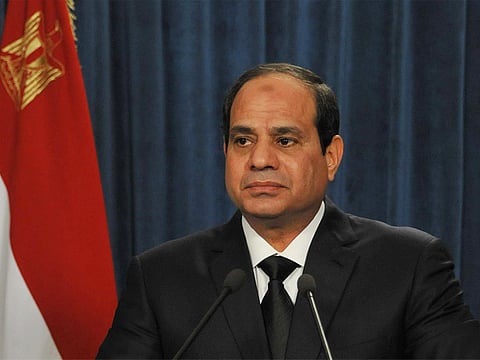Egypt grapples with ‘war on rumours’
Alleged pro-Brotherhood platforms spreading false news to foment unrest

Cairo: “The government urges different media outlets and browsers of social networking sites to observe accuracy and objectivity by contacting the bodies concerned before publishing baseless information.”
This warning has recently popped up in most statements of the Egyptian government as the country is grappling with what officials and experts call a “war of rumours”.
One of the latest rumours, which the government has vehemently denied, alleges an official plan to raise prices of drinking water and fuel, a sensitive issue for Egyptians, who have recently experienced a spate of price hikes due to harsh austerity measures.
Earlier, the government had to deny a rumour that it planned on levying a tax on inheritance.
In a recent public address, President Abdul Fattah Al Sissi said that in just three months more than 21,000 rumours circulated fake news about Egypt.
“These rumours could destroy the country as they aim to stir confusion and instability, and spread despair,” the Egyptian leader sternly warned.
Al Sissi has made re-establishing security and revitalising the ailing economy his top priorities since he took office in 2014.
Pro-state electronic and print media have started running advertisements designed to refute false rumours.
“Don’t believe everything you see on social media. Obtain news from a well-informed source,” a TV advert admonishes viewers.
The issue has also spilled over into night-time talk shows on state and private TV stations, with the now-banned Muslim Brotherhood mostly blamed for the torrent of rumours.
Extra News, an affiliate of the private TV network CBC, has recently launched a programme titled “Rumours and Facts”, which interviews government officials to comment on specific rumours.
“This is a national security issue,” Salah Al Hadi, a political expert, said.
“Egypt has covered a long distance to stand again on its feet since the removal of Brotherhood rule,” he told referring to the 2013 ouster of Islamist president Mohammad Mursi by the army then led by Al Sissi, following enormous street protests against his one-year rule.
“Hostile media platforms and rumour-mongers are not pleased with Egypt’s rise. They will stop at nothing in order to make Egyptians feel hopeless and lose trust in their leadership by spreading malicious rumours that are related to their daily life including food.”
Al Hadi mentioned recent rumours alleging availability of poisonous tomatoes and toxic Chinese fish at the local market, allegations which the government swiftly dismissed as false.
“As Egypt is re-emerging, this war will become fiercer,” he argued. “We should remember that several members of the Brotherhood and their followers are outside Egypt. With support from their financiers, they will not surrender easily.”
Egyptian officials have repeatedly accused Qatar and Turkey, staunch backers of Mursi’s Brotherhood, of providing a safe haven to dozens of Islamists wanted by Cairo.
In recent months, Egyptian authorities have blocked several news websites, accusing them of spreading false news and having links with the Brotherhood, designated as a terrorist group in the country.
“Rumours thrive in the absence of true information and when the citizen is left an easy prey to misinformation from social media and suspicious web sites,” said Hassan Aly, a media professor. “Delay in official comment on any public issue fuels rumours. Absence of media professionalism also helps enemies at home and abroad to spread rumours,” he told semi-official newspaper Al Ahram.
“Therefore, it is necessary to remove curbs on media and allow free access to information from their sources,” Aly said.
Some media watchdogs have accused Egypt of restricting free expression and harassing opponents, accusations denied by authorities.


